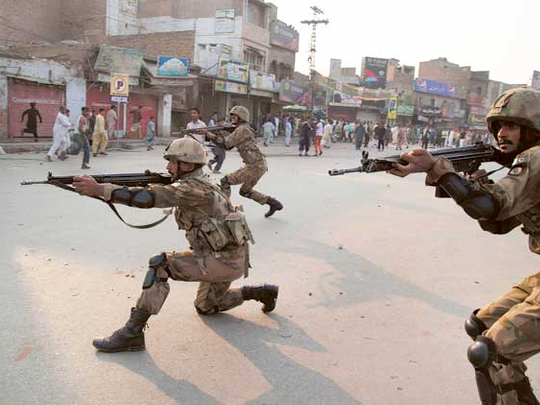
Rawalpindi, Pakistan: Pakistan called in its army Saturday to quell sectarian unrest in three cities, after nine people were killed and nearly 90 wounded in violent attacks across the country, according to officials.
Authorities imposed a curfew in the city of Rawalpindi, where sectarian clashes on Friday left nine people dead and more than 60 injured, and spawned retaliatory violence in at least two other cities.
Fighting erupted in the garrison-city, which neighbours the capital Islamabad, when a procession by Shiite Muslims to mark the most important day of the mourning month of Muharram coincided with a sermon at a nearby Sunni mosque.
“A curfew has been imposed in Rawalpindi city to avert further violence following the incidents on Friday,” Waseem Ahmad, a police official said.
“The curfew will remain until midnight on Saturday. The whole city has been closed down,” he said.
Deeba Shehnaz, a spokeswoman for rescue services, said: “According to the latest figures, we can now confirm the death of nine people from the sectarian violence on Friday. At least 68 others were wounded during the clashes.”
Angry Shiite protesters attacked the Sunni mosque and seminary, torching its building and an adjacent cloth market, where workers on Saturday were still battling to extinguish the fire completely.
Rival groups then attacked each other, TV cameramen and security forces and also fired gunshots.
The authorities deployed large numbers of troops in the city and later imposed a full curfew as soldiers patrolled the streets to stop protesters coming in from other cities.
Violence also erupted in the southern city of Multan and Chishtian town, where civil authorities called in troops to maintain law and order.
A senior police official in Multan said that at least 12 people were injured when people took to the streets to protest the Rawalpindi incident, leading to clashes.
In neighbouring Chishtian, a mosque was partially damaged and several shops were destroyed when they were torched in retaliation for the violence in Rawalpindi.
All entry points into Rawalpindi were blocked, resulting in traffic chaos on Saturday morning that choked parts of the highways leading to Islamabad.
Shahbaz Sharif, the chief minister of Punjab province, of which Rawalpindi is a major city, told an official meeting following the clashes that the government ensure the culprits for the clash are brought to justice.
“We condemn the act of violence in Rawalpindi and sympathise with the aggrieved families. We will take the culprits to the task,” he said in his statement.
But one local legislator, Shaikh Rashid Ahmad, who is a member of the lower house of the parliament from the area said that violence there was the result of local administration’s failure.
“I declare the local administration responsible for Friday’s violent acts. They failed to control the situation,” Ahmad told a news conference.
Pakistan had deployed heavy security all across the country to avert any attack on the processions of Shiites.
Authorities had jammed mobile phone services as part of the security measures on the day, which hampered communication following the clashes. Cell phones in Rawalpindi are expected to remain unconnected for the weekend.
Elsewhere, in an attack unrelated to the sectarian clashes, a security official was killed and nine others wounded when militants targeted security convoys in the north-western Khyber Pakhtunkhwa province.
An Improvised Explosive Device (IED) exploded near a roadside in the northwestern district of Dera Esmail Khan, killing one security official and wounding four others.
In another attack, a suicide bomber blew himself up near a security forces’ convoy and injured five soldiers in Bannu district, which is connected to the semi-autonomous tribal areas on Afghanistan border, branded by Washington as hub of Al Qaida and Taliban led militants.












